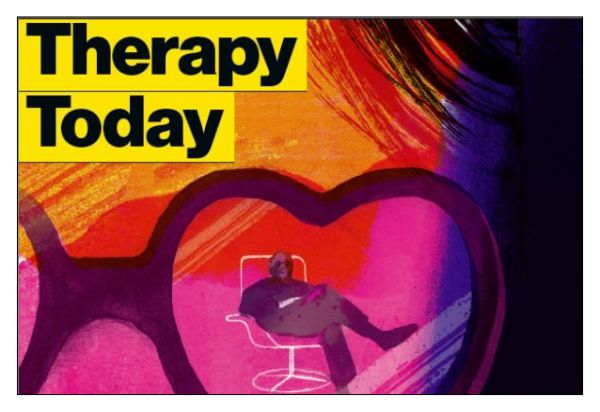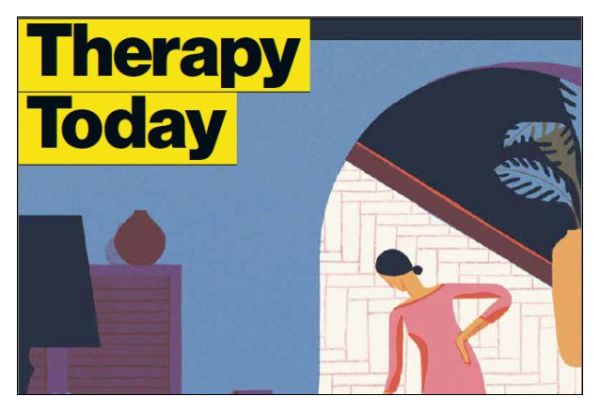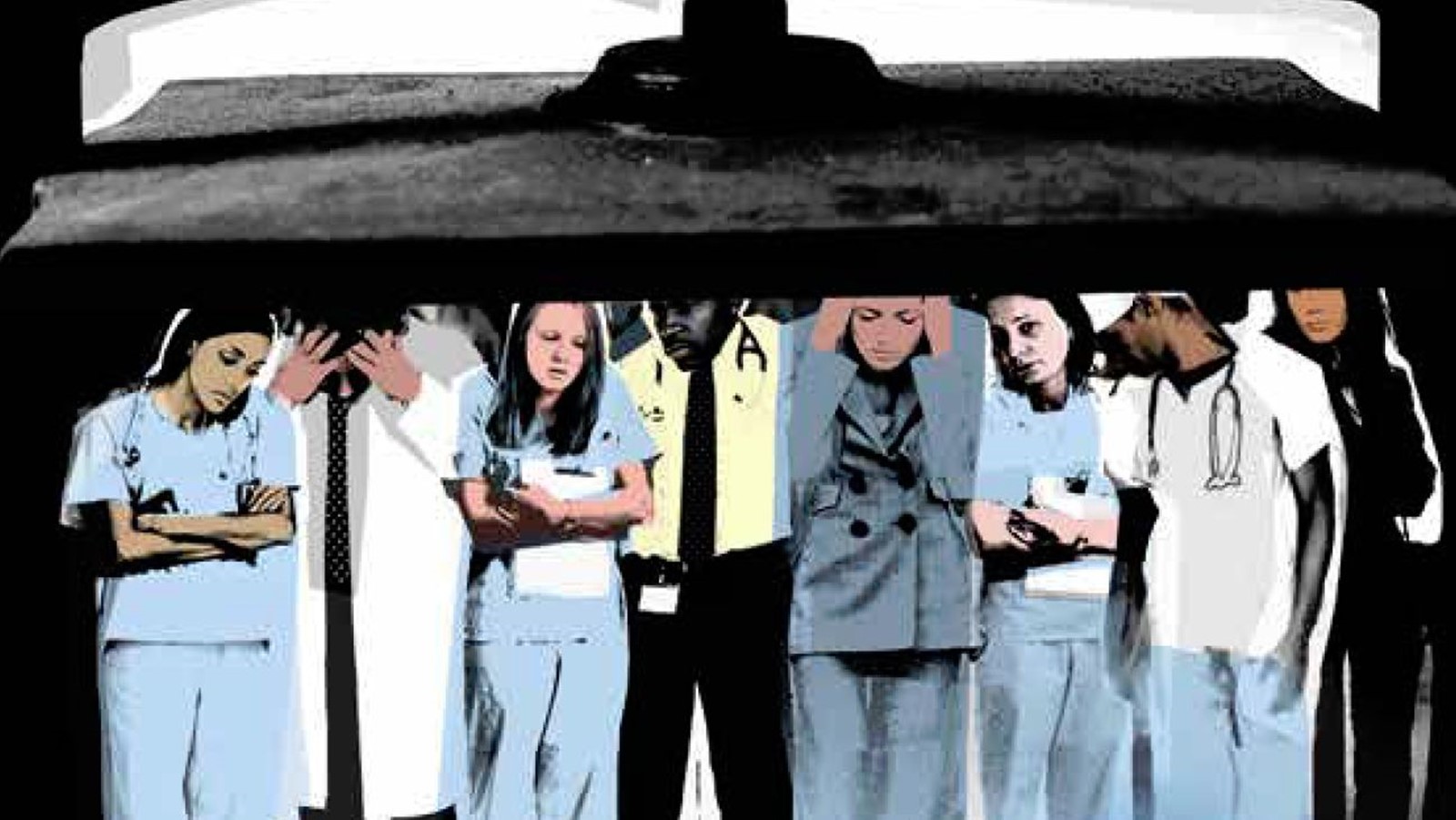We have become a very anxious society. This is reflected in an increasing prevalence of mental health problems, particularly among children and adolescents. All socioeconomic groups are affected. The UK is now close behind the US in measures of inequality (the difference in income between the top 20% of households and the bottom 20%). As Wilkinson and Pickett have shown,1 there is a direct correlation between income inequality and psychosocial problems across all socioeconomic groups. Uncertainty about employment and income is increasingly common in lower-income households in particular, prompting the economist Guy Standing to coin the term ‘precariat’.2 Presumably, too, anxiety about our global future lurks in our collective unconscious.
The focus of this article is anxiety in institutions and how psychotherapists might bring their skills to bear to help understand and contain the dysfunction that uncontained anxiety causes. A key dimension of this is the promotion of genuine reflective practice. My own experience as a medical psychotherapist has been largely within the NHS. Much of what I write here is, however, relevant to institutions in general, although uncontained anxiety has particular effects in those where the primary task is to respond to the ill-being of others. These effects are likely to be particularly marked where there is less use of technology and more reliance on human resources as the agents of change.
Dysfunctional organisations
Readers will have their own list of the problems that beset modern organisational life. Mine include:
- reorganisations following one after another, that are imposed from the top, not thought through, and badly (or barely) implemented
- a ruthless ‘more for less’ philosophy, stretching staff beyond reasonable limits and with no consideration for the effects on both staff and patients
- increased central control and sustained undermining of professional agency
- economies of scale leading to industrialisation that leaves staff feeling as if they are working on a production line and clients feeling like a statistic
- a blinkered approach to risk that sees outcome in terms of bureaucratic accountability rather than engaging more fully in the therapeutic relationship
- a fragmented system that promotes competition over co-operation, market forces over stability, and consumerism over complexity
- a system that overvalues the new and the quick fix, that forgets its history, and fails to learn from experience.
I could go on and on…
Much of this reflects forces at work in society at large. In her book The Perverse Organisation and its Deadly Sins,3 Susan Long describes a shift in society from a culture of narcissism to one of perversion. Perversion flourishes where instrumental relations have dominance – in other words, where people are used as a means to an end, as tools and commodities rather than respected citizens, and where individual gain and pleasure is promoted at the expense of the common good, often to the extent of not recognising the existence of others or their rights. These are the relations that Long described as increasingly dominating modern organisations.
A core aspect of perversion is the capacity of the individual or the organisation to know and not know at the same time. Such conscious and unconscious refusal to see is horribly evident in the stories of neglect and abuse described in the Francis Inquiry into the cruel and neglectful behaviour of staff at the Mid Staffordshire NHS Foundation Trust between 2005 and 2009.4 There is no doubt that the trust board ‘knew’ at some level what was going on. As psychotherapists, we can determinedly help groups at all levels to turn an honest eye: to help people face the reality of their situation, however difficult; to avoid secrets and discourage information being held by elites and subgroups; to encourage transparency in governance arrangements; to keep rules few and simple and owned by all involved, and to encourage all involved to be as engaged as possible with each other and with the organisation as a whole. That is a tall order in the present climate, but not even feasible if we shrink from such engagement.
The effects on individuals
So what does it mean to work with groups of staff in such squeezed, unstable, chaotic organisations? Many staff are at the end of their tether, extremely demoralised and burnt out. Absenteeism is a preoccupation for human resources departments and finance directors, but, if you talk to occupational health physicians, they are much more concerned with presenteeism – the people who continue to work when they should be off sick. A lot of staff are keeping their heads down, concentrating on surviving: ‘getting to the end of the shift without a suicide’.
It can be hard to persuade staff that talking through their experience is likely to be beneficial. Space to reflect can involve people getting in touch with how bad things are, along with their anger and sense of hopelessness and helplessness. While some will find a reflective practice group a lifeline, others will approach it as yet another ‘must-do’ on an ever-growing list of demands on their time. Yet others will feel threatened. It can be hard to move the group on from their feelings about the organisation to reflection on their own practice. Many staff used to experience the NHS as a benign parent, and now feel deeply hurt and betrayed by recent changes. Many have invested deeply in building up a service only to find it dismantled overnight. Some have experienced this many times over and carry layer on layer of unresolved grief, repressing their pain as they struggle on to take care of their next ‘baby’.
It is hard to convey some of the craziness, crass stupidity and brutality that I have observed in some of our more dysfunctional organisations over the last 10 years. One organisation embarked on a process of ‘re-engineering’ that involved making all the ward managers re-apply for their jobs. Some were demoted; others, the successful ones, were deliberately reassigned to different wards and specialties, thereby denigrating expertise and breaking up well-functioning teams, all in the name of ‘moving people out of their comfort zones’. The systemic denigration of attachment is one of the most worrying aspects of modern organisations and, again, a matter about which we as psychotherapists have a lot to say.
The importance of history
We also have much to say about the importance of knowing and owning our history. I recently spent a week in Berlin, where layers of history are openly there for all to reflect upon. I found myself imagining living through these different regimes and wondering how I would have behaved.
The encouragement and expectation to honestly explore our history are not so prevalent in the UK. I find that a younger generation of psychiatrists, for example, is largely unaware of the history of psychiatry, its Victorian containment system, and its tragic list of perceived advances that in retrospect seem cruel and, in many cases, frankly unscientific. Having a sense of this gives an important perspective on our present so-called advances and, for me, acted as a safeguard against professional arrogance. More generally, the phrases ‘get over it’ or ‘move on’, often delivered in a patronising tone, are overused, and now usually mean ‘stop feeling’ or ‘stop asking difficult questions’ – hardly supportive of reflective practice, let alone organisational competence.
The fact that the new is idealised also inhibits us from turning an honest eye to the future. Denial is rampant. In health, social care and education, new initiatives tend to get implemented without the necessary exploration of possible unintended consequences or the impact on the system as a whole.
The problem of mistrust
Another theme that emerged from my visit to Berlin, and from reading about the regime in the German Democratic Republic (GDR),5 was the deep mistrust those in power felt towards their citizens. The leaders of the GDR were German communists (some of them Jewish) who had escaped the Nazis by moving to Moscow or other parts of Europe. Some of them, for example, had fought for the French Resistance. They settled back in East Germany for ideological reasons, but were in effect governing those with whom they had been at war, those who had persecuted them and driven them out, those they saw as the enemy. This context of mistrust seems to me fundamental to understanding why it became such a persecutory culture.
Although it is not of the same order, mistrust also seems to be one of the defining characteristics of 21st century Britain. We are governed by people who profoundly mistrust the public sector and seem to have a need to denigrate the poor and the vulnerable.6
The philosopher Onora O’Neill spoke about this issue of trust in her Reith lectures back in 2002,7 but it seems that things have continued to get worse. O’Neill argued that we have got the problem wrong; we behave as if there is a crisis in trustworthiness when there is in fact no evidence that people are less trustworthy than they were in the past. The real crisis is about the lack of trust, the growing culture of suspicion, linked to excessive accountability regimes. It is difficult for people who are micro-managed, who are constantly watching their back, to develop into discerning professionals who can rely on the wisdom they have gained through experience. What goes on in reflective practice groups of course reflects these dynamics. Complicated issues around trust and trustworthiness are talked about over and over – and acted out. It is not easy to create a culture in the group where participants feel safe enough to risk being open, where they feel able to be more fully themselves.
Naming and containing anxiety
The need for reflective practice across health and social care is self-evident to readers of this journal, but in the wider world there is a massive gap between rhetoric and practice. At the same time as the importance of reflective practice is being extolled, attention is distracted and time consumed by an ever-lengthening list of ‘must-dos’ that do not just distract but demand a very different mindset. Unfortunately, reflective practice groups are rare outside mental health and hospice settings, and even in mental health settings they are not the rule, despite significant evidence that they are helpful.8
As people with a particular interest in psychotherapeutic ideas and group dynamics, psychotherapists have important things to say about reflective practice. But we need to continue to search for creative ways of developing our ideas and making them accessible. For example, I once led a reflective practice workshop with a group of trainee surgeons. Their antagonism was palpable. Then it dawned on me that this group of rather black-and-white-thinking clinicians was regarding reflective practice as a form of confession. They felt they were being asked to list their mistakes and show appropriate remorse. Once I had worked this out, we could have a more constructive conversation.
Finding a language to bridge very different worlds is important. In my first week of medical school, the professor of general practice told us we would learn thousands of new words and concepts over the next five years and then spend the next 40 years searching for ordinary words to communicate them to our patients. Psychotherapists have to learn a similar lesson when thinking about work with organisations – we have to reflect on how outsiders might see us; their anxieties and prejudices about us and what we might be trying to do to them, and how we can help to open up their worlds, rather than shut them down. We have to get the starting point right. The concept of ‘emotional labour’ being integral to the healthcare task is helpful.
I like to think of us as experts in anxiety. We know the lengths to which individuals, groups and organisations will go to defend against anxiety, to project it, displace it and deny it, and in so doing distort and disregard reality. At the present time, our institutions are driven by anxiety in a way that few can understand, let alone articulate. At every level, there is repression of history and a manic reactive response to problems – quick-fix solutions that tend to overload and fragment the system, making things worse.
One person who understood and documented the effects of anxiety on organisations was Isabel Menzies Lyth.9 Her famous study in the 1950s sought to understand why nurses resigned from their profession in such high numbers. She proceeded to show how an organisation (the hospital, in this case) can be seen as consciously and unconsciously structured around the evasion of anxiety. She went on to study many other types of organisation, and proposed that the success and viability of a social institution was intimately connected with how it contains anxiety.
These ideas have been developed to look at the ‘goodness of fit’ between organisational structures on the one hand and the emotional demands of the work on the other. Unfortunately, they have made little impact on the system as a whole; there is little understanding or attempt to contain the primitive anxieties that pervade a system and affect all involved, including decision-makers at government level. If anything, there is more disconnection nowadays between the policy-making level in an organisation and the emotional reality of frontline encounters. We desperately need leaders who can contain their own anxiety and understand the importance of emotional work at every level of the organisation: leaders who understand that the psychological task is fundamental to the job; leaders who understand the absolute importance of reflective practice.
As psychotherapists, a temptation is to withdraw self-protectively from the organisations to which we are linked and in which we work, hoping to keep our heads down and get on with the ‘work’. But this is naïve: it avoids the reality that the relationship is important, our paths interwoven, the dynamics enmeshed and the potential to influence each other significant. I think there is scope to intervene as psychotherapists at three levels.
First, an increasing number of our clients are presenting because of stress at work. It is important to have some understanding of the pressures on staff in modern organisations, to be able to enquire intelligently about this and to recognise the pervasive effect that the psychosocial work environment can have on a person’s identity and self-esteem.
Second, some of us should continue to work with frontline staff where we can, particularly in health and social care settings where a culture of reflective practice is established – albeit rather weakly. Speaking personally, I find the work both frustrating and endlessly touching. I am often being told ‘it made all the difference’, and feel humbled that such a little of what often feels like common sense can go such a long way. Sadly, I often feel I am simply helping people fire-fight, and that I am working with staff beaten down by a toxic system.
Third, as psychotherapists, we have some expertise in anxiety, and good reason to engage confidently with the discourse about the state of our institutions. We need to find ways to challenge the prevailing philosophy that deals with problems in an over-reactive way, often compounding the pressure with bureaucratic pseudo-solutions. Finding a way to frame the problem in terms of primitive anxiety and its perverse effects on individuals and organisations would be a good start.
Penelope Campling is a medical psychotherapist with a long-standing interest in the culture of organisations. Her books include Intelligent Kindness: reforming the culture of healthcare (with John Ballatt (RCPsych Publications, 2011)). She is now retired from the NHS but works as a psychotherapist, and campaigns and writes about healthcare culture. A longer paper on this subject is published as ‘Opportunities and Pitfalls of Reflective Practice in an Age of Austerity’ in Psychotherapy and Politics International 2016; 14: 48–60.
More from Therapy Today

Transference love and harm
Open article: Dawn Devereux explores the powerful phenomenon of idealising transference and the harm it can do to clients. Therapy Today, September 2016

Does counselling make a difference?
Open article: Catherine Jackson asks whether the future is looking brighter for counselling within IAPT. Therapy Today, July 2016

Can software ever replace the therapist?
Open article: As the NHS seeks to expand access to talking therapies within limited resources, digital technology could provide the solution, writes Bina Convey. Therapy Today, June 2016
References
1. Wilkinson R, Pickett K. The spirit level. London: Allen Lane; 2009.
2. Standing G. The precariat: the new dangerous class. London: Bloomsbury; 2014.
3. Long S. The perverse organisation and its deadly sins. London: Karnac; 2008.
4. Francis R. The independent inquiry into care provided by Mid Staffordshire NHS Foundation Trust, January 2005–March 2009. London: HMSO; 2010.
5. Leo M. Red love: the story of an East Berlin family (trans. S. Whiteside). London: Pushkin Press; 2013.
6. Jones O. Chavs: the demonization of the working class. London: Verso; 2011.
7. O’Neill O. A question of trust: the BBC Reith lectures 2002. Cambridge: Cambridge University Press; 2002.
8. Shoenburg P, Yakeley J. Learning about emotions in illness: integrating psychotherapeutic teaching into medical education. London: Routledge; 2014.
9. Menzies Lyth I. The functions of social systems as a defence against anxiety. (First published 1959.) In: Menzies Lyth I. Containing anxiety in institutions. Selected essays: volume 1. London: Free Association Books; 1988.
